Reading: Unit 9 Lecture Transcripts & Illustrations
Unit 9 Lecture 1
When a terrible persecution broke out all across the Empire in the year 250 or so, the man who was the teacher in the catechetical school of Alexandria was brought before the governor of the region and he was investigated as to whether he was loyal to the Emperor. The following account was written by him to recall for his readers what had happened to him and his companions in that critical time. Dionysius wrote this:
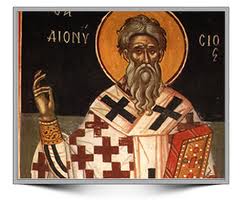
I am really in danger of falling into much foolishness and I lack the right feeling through being compelled of necessity to narrate God’s wondrous consideration concerning us. But since “it is good,” it says, to keep close the secret of a king but glorious to reveal the works of God,” later I will recount our facing of our violent accuser, Germanus. I did not came before Æmilian alone; for my fellow-presbyter Maximus, and deacons Faustus, Eusebius and Chæremon were with me. And one of the brethren who was present from Rome came in with us.
Now Æmilian did not say to me at the start, “Do not summon” the brethren for public worship: for that was superfluous and the last thing to insist on, since he was going back to the very beginning of the matter. For the question was not about summoning others but about being Christians ourselves, and it was from this that he ordered us to desist, thinking that if I should change my mind, the others would follow me. And I answered kindly and not very differently from the words: “We ought to obey God rather than men.” I testified outright that I worship the only God and none other, nor will I ever alter nor desist from being a Christian.
Upon this he ordered us go away to a village on the borders of the desert named Cephro. Listen then to what was said on both sides as it was officially recorded: Dionysius, Faustus, Maximus, Marcellus and Chæremon being brought in, Æmilian the Prefect said: “In the course of conversation I described to you the kindness which our Sovereigns have displayed towards you. For they gave you opportunity of being set free if you would adopt a natural line of conduct and worship the gods who protect the Empire and give up those who are contrary to nature. What do you say to this? for I do expect you will be grateful for their leniency when they invite you to a better course.” Dionysius answered: “It is not a fact that all men worship all gods, for each worships certain whom he believes in. So with us, we worship and adore the One God, the Creator of all things, who has entrusted the Empire also to the most religious Emperors, Valerian and Gallienus; and to this one God we pray without ceasing for the good of their Empire.” Æmilian the Prefect said, “But who prevents you from worshipping your god also, if he be god, with the natural gods? for you were ordered to worship gods which are familiar to all.” Dionysius answered: “We worship none other but the One God.” Æmilian the Prefect said to them: “I observe that all of you are both ungrateful for and oblivious to the leniency of our Emperors. Therefore you shall not live in this city but shall be dismissed to the parts of Libya and stay in a place called Cephro, which I have chosen at the bidding of our Emperors. And both you and others will be absolutely forbidden either to hold meetings or to enter the so-called cemeteries. And if any one of you were to appear to have failed to arrive at the place I have ordered or were found at any assembly in this city, he will do so at his own risk. For the necessary penalty will be sternly enforced. Be off therefore to where you were ordered.” So he hurried me away even though I was sick, granting me not a day’s respite. What leisure, then, had I to call assemblies or not?
Further on he says—
But we did not give up from the visible assembling of ourselves together in the Lord’s presence, but I even more earnestly urged those who were in the city Alexandria to assemble, as if I were still with them, being absent in the body, as it says, but present in the spirit. And at Cephro also a large number of the Church were staying with us, consisting of the brethren who had followed us from the city or were present from other parts of Egypt.
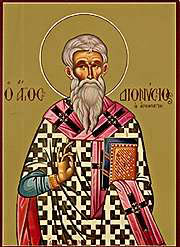
There, too, the Lord opened before us a door for the word. And at first we were pursued and stoned, but later many of the Gentiles left their idols and turned to God. Thus we were the first to sow the word in the hearts of those who had not previously received it. And it seemed as though God led us to them just for that reason, and having sown the Word among them, God led us away again. For Æmilian wished, as it seemed, to transfer us to rougher and more difficult areas, and he ordered those who were scattered in every direction to draw together to the lake Mareotis, assigning to each party one of the villages of the district, but he put us on a longer road so that we should be the first to be arrested. For he evidently managed and arranged so that it would be easy to capture us whenever he wished to seize us. And as for me, when I was ordered to depart to Cephro, I did not even know in what direction the place lay, hardly having heard so much as the name before; and yet I went off willingly and without trouble. But when it was told me that they would remove me to the parts of Colluthion, all who were present know how I was affected. For here I will accuse myself. At first I was vexed and took it very ill. For though the place happened to be better known and more familiar to us, yet people said there were no Christians there and no respectable folk, because living there one is exposed to the annoying antics of drifters and the attacks of robbers. But I found consolation when the brethren reminded me that it is nearer to the city of Alexandria, and that, while Cephro gave much opportunity of communication with brethren from Egypt in general, so that one could draw congregations from a wider area, yet at Colluthion we should more constantly enjoy the sight of those who were really loved and most intimate and dear. For they would be able to come and stay the night and there would be district-meetings as is the case with outlying suburbs. And so it turned out.
Meanwhile, there was a bishop in the area of Alexandria named Germanus who made things difficult for Dionysius by claiming that he, Germanus, had proven much braver than Dionysius. He had not left his pulpit. His bravery had proven that he was a greater teacher than Dionysius and so on.
Dionysius writes this about what happened to him—
Many indeed are the confessions of faith over which Germanus prides himself: many are the things which he has to mention as having happened to him. Can he reckon up as many in his own case as I can in mine—condemnations, confiscations, sales by public auction, spoiling of one’s possessions, loss of dignities, despisings of worldly honor, contempt of commendations by Prefects and Councils and of opponents’ threats, endurance of clamoring’s and dangers and persecutions and wanderings and tribulations and much affliction, such as are the things which have happened unto me under Decius and Sabinus and up to the present time under Æmilian? But where did Germanus appear? What talk was there of him? However, I withdraw from the much foolishness into which I am falling through Germanus; wherefore I refrain from giving a detailed account of events to the brethren who know all.
So we have heard from Dionysius about his life of tribulation under the persecutions of the Emperors. May we all in our lives be as humble and fearless in the face of danger as he was!
Unit 9 Lecture 2
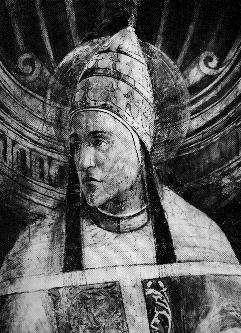
In our day, we often hear of how science has described the beginnings of all that we see. It is often referred to as the big bang – an event that took place, we are told, 14 billion years ago. But that is really only a way to try to have us imagine what took place. It is said that the universe was 9 billion years old before the earth was formed – which is the basis for the term year. So prior to that there was time only in the sense of time since the big bang. It all gets very complicated and it seems to desire to come to a point where there is no need for God. If you and I want to believe in God, that is fine, but do not allow it to come into conflict with science because that would just be ignorant.
Now, I mention this because in the early church, there was a different attempt to separate God from the physical universe. It was said and taught, as we have seen previously, that God is too spiritual and holy to have had anything to do with the world as we experience it in all its physical forms and all its textures and smells and sights. Just as the scientific world today often tries to keep God out of any interference, so called, with what we see and experience, so too did the early gnostic heretics. This faith was a constant threat to the church for its first three hundred years. In fact, it has been around for most of the life of the church, always trying to get us to believe that God would not want anything to do with this physical world as we see it. Novatian was a teacher in the church in the mid-200’s. He was an able teacher who had a significant effect on those who listened to him.
If we follow his life story, we discover that he fell out of favor with the church over his insistence that those who had fallen away during the difficult persecutions could not be reconciled to the church again. They had sinned too grievously to be readmitted after the danger had passed. In the course of his life, he formed a church in opposition to the roman church which lasted for centuries.
Our interest in him is to hear his thoughts on the beginning of the rule of faith or rule of truth as he calls it. I am going to be reading the beginning of his treatise on the trinity which was held to be one of the more profound teachings on the subject. He begins this way:
The Rule of truth requires that we should first of all thing believe in God the Father and Lord Omnipotent; that is, the absolutely perfect Founder of all things, who has suspended the heavens in lofty sublimity, has established the earth with its lower mass, has diffused the seas with their fluent moisture, and has distributed all these things, both adorned and supplied with their appropriate and fitting instruments. For in the solid vault of heaven He has awakened the light-bringing Sunrisings; He has filled up the white globe of the moon in its monthly waxings as a solace for the night; He, moreover, kindles the starry rays with the varied splendors of glistening light; and He has willed all these things in their legitimate tracks to circle the entire compass of the world, so as to cause days, months, years, signs, and seasons, and benefits of other kinds for the human race.
Here Novatian has just made a significant point which we do well to remember ourselves – God created the world and all we see in it for the benefit of the human race. God’s original intent was for us to live in great harmony with the creation, but we have fallen into sin and as a result, we live in constant conflict with our world. We no longer know how to properly care for it and we abuse it and abuse each other as we spoil what God originally made for our benefit. He goes on:
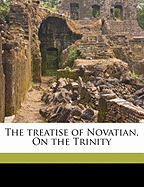
On the earth, moreover, He has lifted up the loftiest mountains to a peak, He has thrown down valleys into the depths, He has smoothly levelled the plains, He has ordained the animal herds usefully for the various services of men. He has also established the oak trees of the woods for the future benefit of human uses. He has developed the harvests into food. He has unlocked the mouths of the springs, and has poured them into the flowing rivers. And after these things, lest He should not also provide for the very delights of the eyes, He has clothed all things with the various colors of the flowers for the pleasure of the beholders.
Novatian sees the creation as a way for us to have a sense of wonder of God. God has carefully developed the world for humanity. And he has made it all so beautiful to see.
Even in the sea itself, moreover, although it was in itself marvelous both for its extent and its utility, He has made manifold creatures, sometimes of moderate, sometimes of vast bodily size, testifying by the variety of His appointment to the intelligence of the Artificer. And, not content with these things, lest perchance the roaring and rushing waters should seize upon a foreign element at the expense of its human possessor, He has enclosed its limits with shores; so that when the raving billow and the foaming water should come from its deep bosom, it should return again unto itself, and not transgress its concealed bounds, but keep its prescribed laws, so that man might the rather be careful to observe the divine laws, even as the elements themselves observed them.
Novatian is saying that when we as human beings take careful note of how the seas obey laws which God has set in place for them, we will also take careful note of what laws God has put in place for us!
And after these things He also placed man at the head of the world, made in the image of God, to whom He imparted mind, and reason, and foresight, that he might imitate God; and although the first elements of his body were earthly, yet the substance was inspired by a heavenly and divine breathing. And when He had given him all things for his service, He willed that he alone should be free. And lest, again, an unbounded freedom should fall into peril, He laid down a command, in which man was taught that there was no evil in the fruit of the tree; but he was forewarned that evil would arise if perchance he should exercise his free will, in the contempt of the law that was given. For, on the one hand, it had behooved him to be free, lest the image of God should, unfittingly be in bondage; and on the other, the law was to be added, so that an unbridled liberty might not break forth even to a contempt of the Giver. So that he might receive as a consequence both worthy rewards and a deserved punishment, having in his own power that which he might choose to do, by the tendency of his mind in either direction: whence, therefore, by envy, mortality comes back upon him; seeing that, although he might escape it by obedience, he rushes into it by hurrying to be God under the influence of perverse counsel.
Here Novatian is giving us his theology of the fall. Mankind has been created to be free, but free in such a way that unbridled freedom would lead to an excess which would be an affront to God, we were given a command to keep us in from that excess. But mankind simply rushed headlong into a desire to be as God.
Still, nevertheless, God indulgently tempered his punishment by cursing, not so much the man, as his labors upon earth. And, moreover, what is required does not come without man's knowledge; but He shows forth man's hope of future discovery and salvation in Christ. And that he is prevented from touching of the wood of the tree of life, is not caused by the malignant poison of envy, but lest, living for ever without Christ's previous pardon of his sin, he should always bear about with him for his punishment an immortality of guilt.
Novatian gives his readers an idea as to why it was necessary to send Adam and Eve out of the garden. God had to protect his creature from an immortal guilt. Now it can be dealt with in Christ Jesus. But had there been living forever with guilt, it would have been too much to bear.
Nevertheless also, in higher regions; that is, above even the firmament itself, regions which are not now discernible by our eyes, He previously ordained angels, he arranged spiritual powers, He put in command thrones and powers, and founded many other infinite spaces of heavens, and unbounded works of His mysteries; so that this world, immense as it is, might almost appear rather as the Latest, instead of the only work of physical things. And truly, what lies beneath the earth is not itself void of distributed and arranged powers. For there is a place whither the souls of the just and the unjust are taken, conscious of the anticipated dooms of fixture judgment; so that we might behold the overflowing greatness of God's works in all directions, not shut up within the bosom of this world, however ample as we have said, but might also be able to conceive of them beneath both the abysses and the depths of the world itself. And thus considering the greatness of the works, we should worthily admire the Artificer of such a structure.
That is just the first section of Novatian’s work on the Trinity. It gives us a sense of his method of theological discourse and his insistence on the intimate connections between God and this creation. In so doing, he was confronting the gnostics who, as we have previously seen, denied that God would have anything to do with this physical world.
Unit 9 Lecture 3
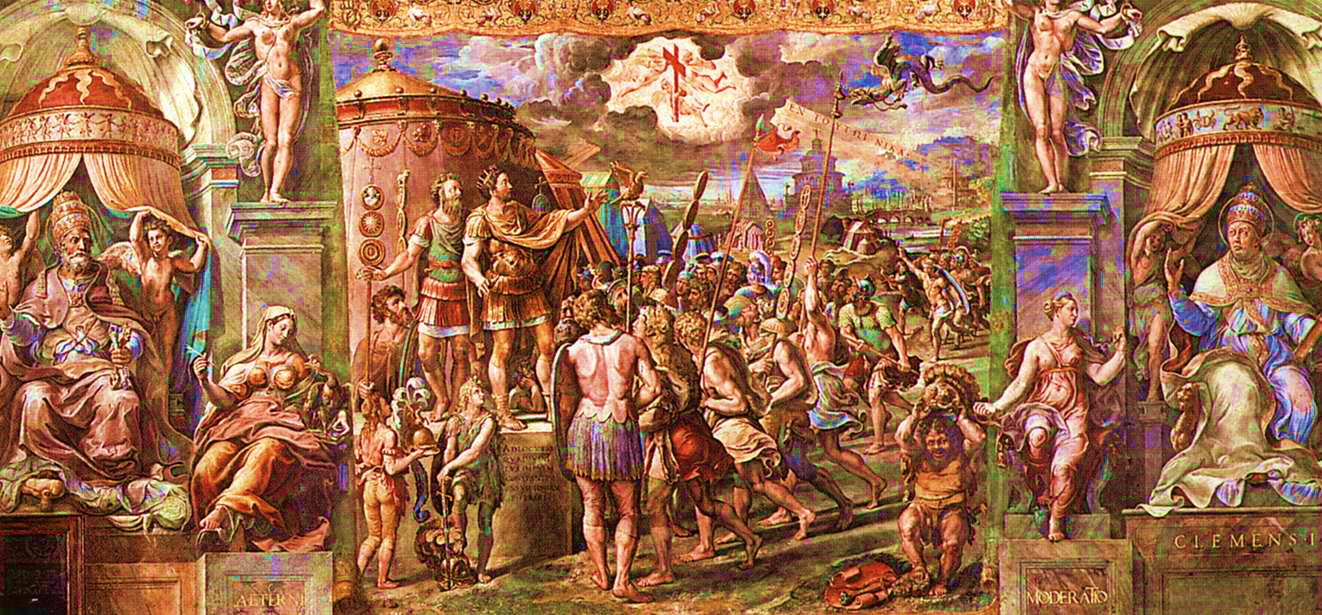
For this lecture I am going to be using material from Bruce Shelly and the Christian history institute. There I found an article which gives us a good overview of the rise of Emperor Constantine and his influence in the Christian church. I hope you can come to realize just how influential this man was in turning the tide for the church. When he became the Roman emperor in 312, just 5% of the Roman population was Christian, by the time the 300’s were over, about 95% of Rome was Christian. He plays a decisive role in the world of that day.
THE FIRST LIFE OF CONSTANTINE describes its subject as “resplendent with every virtue that godliness bestows.” This very public praise of the emperor came from the hand of Eusebius, bishop of Caesarea in Palestine, and perhaps Constantine’s greatest admirer. It is the classic image that prevailed in Eastern Christianity for more than a thousand years.
Historians now debate whether “the first Christian emperor” was a Christian at all. Some think him an unprincipled power seeker who sought only to inflate his ego. What religion he had, many argue, was at best a blend of paganism and Christianity for purely political purposes.
For a six minute video discussing this issue, see
Certainly, Constantine held to ideals we no longer share. He knew nothing of religion without politics or politics without religion. Yet he clearly believed he was a Christian, and he looked back to a battle at the Milvian Bridge, just outside the walls of Rome, as the decisive hour in his newly found faith.
COMMANDER AND STRATEGIST
Constantine’s early years lie mostly in history’s shadows. We know only that he was born in Illyria, a region in the Balkans. His father, Constantius Chlorus, was already a Roman official on the rise. Helena, the daughter of an innkeeper and Constantius’s wife, gave birth to Constantine around A.D. 280 in Naissus, just south of the Danube.
In 293 his father became caesar of the West (assistant to the Western augustus [emperor], Maximiam), and the young Constantine served in the court of Diocletian, the Eastern augustus.
THE MOST WIDELY USED CHRISTIAN SYMBOL
The symbol Constantine made famous was formed by the overlapping of the Greek letters chi (X) and rho (P), an abbreviation for Christos already in use. Sometimes an alpha (a) and omega (w) were added, the first and last letters of the Greek alphabet, representing Christ as the first and the last.
When Diocletian retired in 305, in a realignment of power, Constantine’s father became augustus of the West, and when he died a year later, Constantine succeeded him. The young ruler decided to let the East resolve its own conflicts while he turned his attention to consolidating power in his own empire, gaining valuable field experience as a commander and strategist.
But when Galerius, the Eastern augustus, died in the spring of 311, defending outlying regions became peripheral. Maximian’s son, Maxentius, anxious about Constantine’s power, was in the capital claiming to be the legitimate emperor of the West.
FIELD VISION
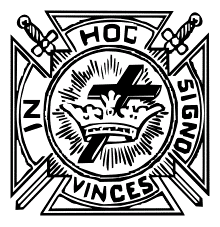
With 40,000 soldiers behind him, Constantine rode south to confront an enemy whose numbers were four times his own.
Under a fatal sense of security, Maxentius waited in Rome, with his Italian troops and the elite Praetorian Guards, confident no one could successfully invade the city. But Constantine’s army was already overwhelming his foes in Italy as he marched toward the capital. When the formidable army at Turin fell, even the Roman crowds turned against Maxentius. At the October 26 chariot races, commemorating the anniversary of his accession two days later, the spectators openly mocked their leader.
The aggravated Maxentius turned to pagan oracles, finding a prophecy that the “enemy of the Romans” would perish on October 28, Maxentius’s accession day. But Constantine was still miles away. Bolstered by the prophecy, Maxentius left the city to meet his foe. He made his stand at a place called Red Rocks, nine miles north of Rome. On one side stood massive hills. On the other flowed the Tiber River. It was a strong defensive position but made retreat difficult.
Meanwhile, Constantine and his army saw a vision in the afternoon sky: a bright cross with the words Hoc vince: “By this sign conquer.” As the story goes, Christ himself told Constantine in a dream to take the cross into battle as his standard.
Though accounts vary, Constantine apparently believed the omen to be a word from God. When he awoke early the next morning, the young commander obeyed the message and ordered his soldiers to mark their shields with the now famous Chi-Rho.
Maxentius and his troops fought well but were overwhelmed by Constantine’s army, which was invigorated by this sign from heaven. Maxentius’s troops fled in disarray toward the surging Tiber. The would-be emperor attempted to escape over the wooden bridge erected to span the stream, but his own army-turned-mob, pressing through the narrow passage, forced him into the river where he drowned by the weight of his armor.
Constantine had no desire to impose his newfound faith as a state religion. “The struggle for deathlessness,” he said, “must be free.”. Constantine entered Rome the undisputed ruler of the West, the first Roman emperor with a cross in his diadem.
WAVERING BELIEVER
Once supreme in the West, Constantine met Licinius, the ruler of the Balkan provinces, and issued the famous Edict of Milan that gave Christians freedom of worship and directed the governors to restore all the property seized during the Diocletian persecution.
Eusebius in his Church History recorded the Christian jubilation: “The whole human race was freed from the oppression of the tyrants. We especially, who had fixed our hopes upon the Christ of God, had gladness unspeakable.”
Constantine’s faith was still imprecise, but few questioned its authenticity. In 314 Constantine sent a message to the assembled bishops at the Council of Arles. He wrote about how God does not allow people “to wander in the shadows” but reveals to them salvation: “I have experienced this in others and in myself, for I walked not in the way of righteousness. . . . But the Almighty God, who sits in the court of heaven, granted what I did not deserve.”
For a decade, though, he wavered. For example, on the Arch of Constantine, which celebrates his Milvian Bridge victory, pagan sacrifices usually depicted on Roman monuments are absent. Then again, there are still no Christian symbols, and Victory and the Sun God are honored.
He had no desire to impose his newfound faith as a state religion. “The struggle for deathlessness,” he said, “must be free.” He seemed to begin where his father left off: more or less a monotheist opposed to idols, and more or less friendly toward Christians. Only through the years did his Christian convictions grow.
Ten years after the Edict of Milan, Licinius had fought his way to supremacy in the East and, given the ambitions of the two emperors, conflict seemed inevitable. In 323 they took up arms to settle their differences. Constantine fought as the Christian champion against an enemy who put his trust in Jupiter.
Constantine triumphed and became the sole ruler of the Roman world.
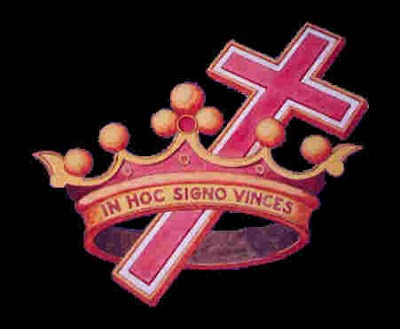
PUBLIC RELATIONS EXPERT
The victory over Licinius enabled Constantine to move the seat of government permanently to the East, to the ancient Greek city of Byzantium (now Istanbul). He enlarged and enriched the city at enormous expense and built magnificent churches throughout the East. The new capital was dedicated as New Rome, but everyone soon called the city Constantinople.
Christians were more populous and vocal in the East than they were in Rome, so during the last 14 years of his reign, “Bullneck” could openly proclaim himself a Christian. He proceeded to create the conditions we call “state-church” and bequeathed the ideal to Christians for over a thousand years.
In 325 the Arian controversy threatened to split the newly united empire into two camps. To settle the matter, Constantine called together a council of the bishops at Nicea, a city near the capital. He ran the meeting himself.
"You are bishops whose jurisdiction is within the church,” he told them. “But I also am a bishop, ordained by God to oversee those outside the church.”
Presiding at the council, Constantine was magnificent: arranging elaborate ceremony, dramatic entrances and processions, and splendid services. He was also a gifted mediator, now bringing his skill in public relations to the management of church affairs.
Unfortunately he could not follow abstract arguments or subtle issues and often found himself at a great disadvantage at these councils. This explains, in part, his explosions of temper and indecisive policy making and why he could be ardent in his convictions yet remain oblivious to moral implications.
FAT WITH FLATTERY
As Constantine grew older, his private life seemed to degenerate. He grew fat and delighted in flattery and elaborate titles. His nephew Julian said he made himself ridiculous by his appearance: weird, stiff Eastern garments, jewels on his arms, a tiara on his head, perched crazily on top of a tinted wig.
He waited until death drew near to be baptized as a Christian. His decision was not unusual in a day when many Christians believed one could not be forgiven after baptism. Since the sins of worldly men, especially those with public duties, were considered incompatible with Christian virtue, some church leaders delayed baptizing such men until just before death.
He gave his sons an orthodox Christian education and his relations with his mother were generally happy, but he continued to act as a typical Roman emperor. He ordered the execution of his eldest son, his second wife, and his favorite sister’s husband. No one seems to be able to explain fully his reasons.
While many of his actions cannot be defended, he did bid farewell to the old Roman gods and make the cross an emblem of Victory in the world.
